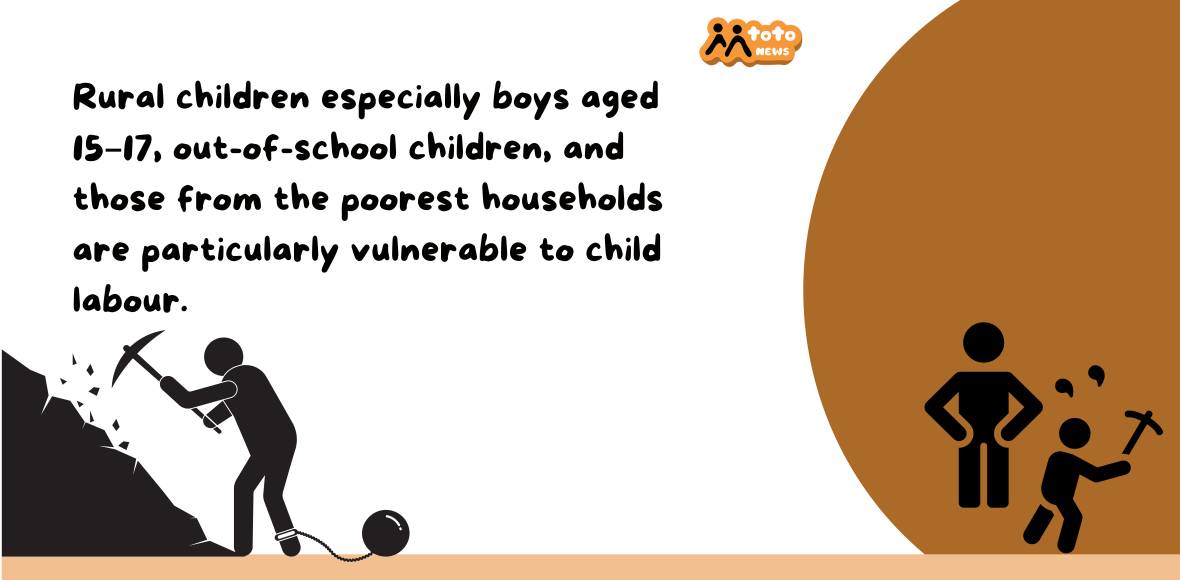
By Alice Njoki
Tanzania has reported notable progress in its fight against child labour, with a significant reduction in cases recorded over recent years. According to a joint report released by the United Nations Children’s Fund (UNICEF), the National Bureau of Statistics, and the Office of the Chief Government Statistician for Zanzibar, child labour rates in the Mainland dropped from 35% in 2014 to 26% in 2021. Zanzibar also saw a reduction, from 9.0% to 7.0% over the same period.
The report, which utilizes data from the 2020/21 sectoral survey and the Integrated Labour Force Survey (2014–2021), provides a comprehensive analysis of child labour trends across Mainland and Zanzibar. This progress aligns with Tanzania’s efforts toward achieving Sustainable Development Goals (SDGs) 8.7 and 16.2, which aim to eliminate child labour, abuse, and exploitation.
However, despite these achievements, the battle against child labour is far from over. Challenges such as gender disparities, socioeconomic inequalities, and structural barriers continue to jeopardize efforts. “Girls often shoulder unpaid household tasks, adding complexity to the gender dynamics of child labour,” noted Dr. Albina Chuwa, Director General of the National Bureau of Statistics.
Agriculture remains the largest sector contributing to child labour in Tanzania, accounting for 84% of cases. Children engage in crop farming on the Mainland or fishing in Zanzibar, often under hazardous conditions that threaten their health and safety. These include exposure to toxic fumes, heavy lifting, and long hours, averaging 23 hours per week.
The report highlights that rural children, boys aged 15–17, out-of-school children, and those from the poorest households are particularly vulnerable to child labour. Lack of birth certificates and inadequate access to quality education further exacerbate the problem. “These factors underscore the socioeconomic and structural drivers behind high rates of child labour,” the report states.
The Tanzanian government has taken critical steps to address these barriers. Recent initiatives include:
- Reversing policies that permanently expelled pregnant girls from school, now allowing them to return after pregnancy.
- Allocating resources to improve educational access through additional classrooms, latrines, and desks.
- Conducting awareness campaigns on human trafficking and training local committees on child labour and related issues.
“Reliable data is essential for designing evidence-based policies and accelerating efforts to eliminate child labour in all its forms,” said Dr. Chuwa. The report emphasizes expanding social protection programs, such as cash transfers to vulnerable families, and raising awareness about the dangers of child labour.
UNICEF’s Country Representative, Elke Wisch, acknowledged Tanzania’s progress while stressing the need for sustained efforts. “Every child deserves a childhood free from exploitation, the right to protection, education, and the opportunity to thrive,” she said. UNICEF and its partners remain committed to supporting the government in strengthening social safety nets and returning children to school.
International reports, such as one from the U.S. Labour Department in 2021, have also drawn attention to gaps in Tanzania’s legal framework and enforcement mechanisms. These include insufficient protections for children involved in illicit activities and domestic work, as well as an inadequate number of labour inspectors.
The report advocates an integrated policy approach that combines poverty alleviation with educational access. Recommendations include:
- Expanding cash transfer programs to alleviate economic pressures on families.
- Promoting child labour-free certification for industries and regular inspections in high-risk sectors like agriculture and mining.
- Engaging local leaders to raise awareness about the long-term benefits of education.
As Tanzania continues to tackle child labour, its collaborative efforts with international organizations, local communities, and industry stakeholders remain crucial. “While we celebrate the progress made, the fight is far from over,” Wisch emphasized.

Leave a Reply